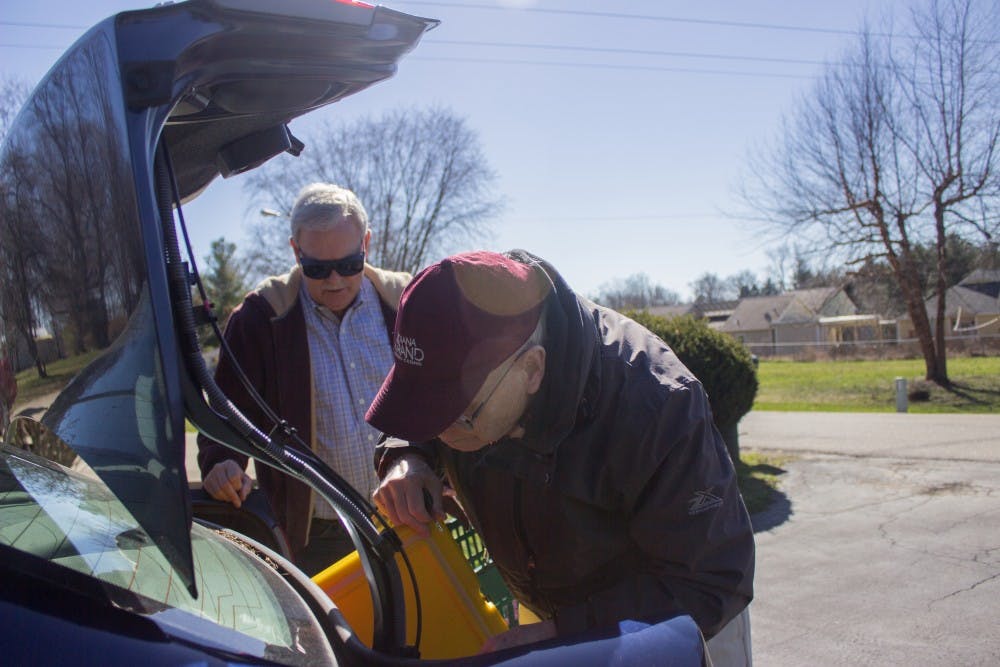Two volunteers loaded up the trunk of a Toyota Corolla on a Wednesday morning in March with a container full of hot meals to be handed out to the recipients of Bloomington’s Meals on Wheels program. Bill Milroy and Pat Patterson do this together once a month.
Bloomington Meals on Wheels provides two meals, one hot and one cold, a day to people who can’t cook for themselves. The majority of its clients are older than 65.
With a new administration in the White House, some of these clients may have to worry about the future of their daily meal deliveries.
In his recent budget proposal, President Trump suggested cuts to the Department of Health and Human Services, which has people who care about the Meals on Wheels programs worried. Meals on Wheels organizations across the country partly rely on funding from the Older Americans Act Nutrition Programs, which is run by HHS. It is currently unclear how OAANP will be affected by the cuts. However, the almost 18-percent decrease in HHS spending, as well as the gutting of the Community Development Block Grant program, has people spooked.
Bloomington Meals on Wheels Director Kathy Romy said she thinks the budget cuts are short-sighted.
“It saves the taxpayers hundreds of millions of dollars every year from the health care industry,” she said about the program.
Mick Mulvaney, Trump’s budget director recently made comments at a press conference that Meals on Wheels is “just not showing any results.” This bothered Romy, she said.
“Nothing could be further from the truth,” she said.
Meals on Wheels does a lot more than feed people, Romy said. It keeps people in their homes and out of hospitals or expensive nursing homes and provides a sense of security and daily socialization for its clients. This is very important for the elderly population, she said.
Meals on Wheels Bloomington currently serves more than 60 clients and has more than 200 volunteers.
According to Meals on Wheels America, 83 percent of Meals on Wheels recipients in Indiana report that the deliveries improve their health, and 92 percent say it enables them to remain living at home.
Milroy, 75, knows firsthand about the benefits of the program. When he contracted a bad case of pneumonia five years ago, he was hospitalized. When he left the hospital he was home-bound, so Meals on Wheels brought him food every weekday for a year while he recovered.
Milroy was impressed with how dependable the service was.
“They never missed a day,” he said.
For about half of the program’s recipients in Bloomington, the Meals on Wheels delivery people are often the only people they get to see every day, Romy said.
Client Alice Vaughn, who is home-bound and wheelchair-bound, reiterates the importance of the socialization brought by Meals on Wheels deliveries.
“I really appreciate you guys,” she said to Patterson, 69, on a recent delivery. “I live here in this house by myself.”
Last week, Romy sat in her office when a volunteer came in to tell her that one of the clients hadn’t opened the door when she knocked. The volunteer had called the woman’s son, who said he would go and check on his mother. Romy assured the volunteer that the client in question, a dementia patient, often sleeps very soundly.
“You did the right thing,” Romy said.
Romy stressed the importance of Meals on Wheels not just as a meal delivery service but as a daily check-in for their clients. Eighty-seven percent of clients in Indiana say the service makes them feel more safe and secure.
Romy also argued that it would be more economical to put money into programs like this, rather than take it away.
“I can feed a senior for a whole year for what it costs for a day in the hospital,” she said.
Romy said it costs her around $1,500 per year to feed one client.
Bloomington Meals on Wheels currently relies completely on private donations, thanks in part to a partnership with the Bloomington Hospital Foundation, which does the majority of their fundraising. However, many Meals on Wheels programs in other parts of the country rely on federal funding. Romy said she believes that the budget cuts could create a domino effect that will put additional stress on the programs, including in Bloomington.
The local Area 10 Agency on Aging, which provides resources to the elderly population, relies heavily on funding from the Older Americans Act, according to Romy. If HHS funding is cut, the agency may have to start turning people away, and in turn those people would rely on services from programs like Meals on Wheels. However, Bloomington Meals on Wheels can only take on so many clients. Its current maximum capacity is 84 clients per day. If programs that benefit the elderly are severely cut, they may have nowhere to turn.
On one of their stops this month, Milroy and Patterson dropped off food to Lawrence Reagan, a former Meals on Wheels volunteer.
Patterson walked up the ramp on the big blue deck in front of Reagan’s house and knocked on the door, calling out “Meals on Wheels!” Milroy waited at the car.
Reagan answered the door with a big smile on this face. He finds grocery shopping for himself to be too difficult, so he relies on the meals for good nutrition.
“I wouldn’t eat as well without this program,” he said.
After chatting for a moment, Reagan thanked Patterson and Patterson headed back to Milroy’s car.
Patterson voted for Trump. He said he doesn’t agree with everything the president has done, but he thinks the United States needed a change that Trump was able to bring. Patterson said he believes, however, that there should be help available for the more vulnerable people in the country.
“We should take care of the people who can’t take care of themselves,” he said.





